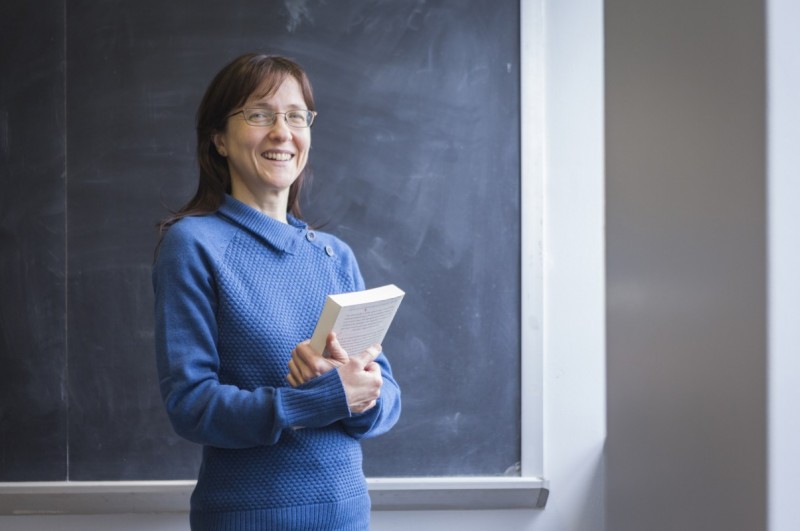As a linguistic anthropologist, Binghamton University Associate Professor of Anthropology Sarina Perrino knows the intimate power of stories, their strong tug that reflects both human relationships and the surrounding culture.
Growing up in northern Italy, she was familiar with her family's stories: tales of two world wars, hardships and survival. But there were tales that went untold until the coronavirus swept into Italy and then across the world: of how her late grandmother survived 1918-1920 as a young child, and how a great aunt lost her life to that pandemic a century ago.
In "Narrating Pandemics across Time and Space," recently published in Anthropology and Humanism, Perrino explores how stories of past pandemics reemerged during the COVID-19 crisis.
"It was emotionally challenging to engage in a more intimate and personal stance in my research. During the COVID-19 pandemic, however, there have been a flourishing of similar short dispatches, chronicles and essays, to convey states of fear and dread when facing an unknown, daily reality," she said.
Starting in April 2020, Perrino began working on an autoethnographic project with nine colleagues from across the globe, including Professor of Anthropology Joshua Reno. The project continued through early 2022, and will become a collective book this fall, she said.
The project is an example of autoethnography, which combines elements of ethnography and autobiography. Classically, anthropologists write ethnographies about the languages, cultures and ideologies of people living in their area of research. In autoethnographic research, they use their own life experience to examine and understand sociocultural and linguistic realities, Perrino explained.

As someone who studies storytelling, it's useful to turn the lens to your own stories.
"Autoethnography is naturally connected to storytelling practices, since an autoethnographic essay mainly contains the ethnographer's personal narratives," she said.
Human beings are storytellers by nature, swapping tales during daily activities at home, school or work, in digital spaces or out in the community. Anthropologists collect many stories among their data; linguistic anthropologists in particular tend to examine discursive practices such as narratives not only for their content, but for the dynamics they reveal between the storyteller and the audience, or the interviewer and subject.
Perrino was born and raised in Italy, before moving to the United States to pursue her graduate studies in linguistic anthropology. While her dissertation took her to Senegal, her current research has brought her back to northern Italy, where she typically studies migration issues.
Family stories
These familial and research ties put the coronavirus on her radar earlier than many people in North America. By February 2020, she was already looking for masks and hand sanitizer to send to her family in Italy, where supplies were running short. During one February supermarket trip, she intended to purchase five or six bottles of Purell to send home, but found a single, small bottle on largely empty shelves.
"Since that moment, I realized that what had happened in Italy was going to happen in the United States as well. Nobody was prepared for a pandemic of such proportions," she remembered. "Many of my American friends thought that I was exaggerating, that it was not going to happen in the United States. And then, on March 19, all our classes at Binghamton University and elsewhere went virtual."
During Italy's lockdown, Perrino was shocked when her parents shared previously unknown family stories about the last pandemic, a century ago. She wondered why her grandmother, with whom she had been close, never mentioned these stories, even though she shared others about privations suffered during two world wars.
"There might be a general unwillingness to talk about specific past hardships/traumatic events. Perhaps, in the future, some of us might do the same with our COVID-19 related challenges," Perrino suggested.
Those painful memories wouldn't be erased, but would simply go untold to future generations - until similar circumstances arose. Then, those narratives might resurface, just as they did in Perrino's family. War-related stories, on the other hand, don't face this sort of silence. Perhaps that's because there is a clearer sense of who the heroes are and a visible enemy on which to focus, she said.
While social media has been a key method for sharing stories during the coronavirus pandemic, digital spaces weren't available in 1918. Perrino has been reading novels and reports from that time, and those written later by survivors. These narratives feel very pertinent to today, she said.
In light of our shared pandemic experience, she encouraged readers to consider ways to keep their own family stories alive.
"Perhaps we should think more about our past stories and about the ones that have not been told. We should take our time and ask our parents and grandparents to tell us their stories; we should listen to them carefully without missing any details," Perrino said. "I would do so more intensely with my grandparents if they were still alive. I still have so many questions for them."







